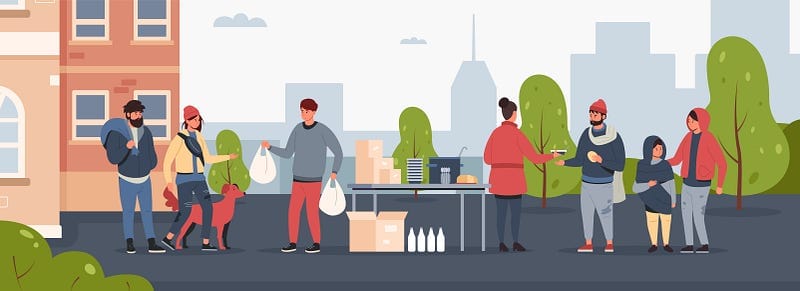Poverty is Never the Fault of the Poor
Reflecting on the blessings and the woes in the Gospel of Luke

Reflecting on the blessings and the woes
The Christmas before I turned 11 years old, I was at a party in the parking lot of Orillia’s Miracle Food Mart, a popular Ontario grocery chain up until the mid-1990s.
However, this was more than a just a party. It was also a rally. A festive rally, but a rally nonetheless. It was a demonstration of striking food retail workers. Beginning in November 1993 and ending February 1994, the 14-week job action was one of the longest in Canada. It was angry. It was bitter. Blue-collar strikes are often different than those of unionized professionals. I remember stories of fistfights on the picket lines. Black eyes. Bloody noses. Broken bones.
The end result (and in my opinion, the direct result of grossly inadequate union leadership) was an across the board $1.75 wage decrease for full-time workers, full-time job hours moving from 37 hours a week to 24 hours, and 700 jobs being eliminated from a 6500 person workforce. Women overwhelming bore the brunt of these wage losses*.
[*For an much deeper dive into the Miracle Food Workers Strike, particularly its consequences for female employees, please read Jan Kainer’s Gender, Corporate Restructuring and Concession Bargaining in Ontario’s Food Retail Sector.]
The hardest-hit department across all 63 stores in Ontario was the meat department. My father was a meat cutter — at one time, a trade that required a three-year apprenticeship. With most butchering and meat cutting moving to large factory operations in the GTA, my father was one of those 700 workers forced into taking a buyout.
But let’s get back to Christmas.
By the time Christmas came around, the Miracle Food Mart employees had been on strike for over six weeks. Christmas is a hard time not to have an income. So, all of the employees who were parents submitted the gender and ages of their children to their union rep. The union then provided donated toys to the families so that every child would have something to open on Christmas morning.
My father was given toys to put under the tree for us. I have three younger brothers, and each of them received reasonably acceptable gifts.
My present was plastic makeup kit — the kind you give to a toddler. Toy lipstick. Toy blush. I was going to be 11 in five days. I was not a very “girly-girl”. I had approximately zero percent interest in makeup or the colour pink. It was probably the worst Christmas gift I’ve ever received in my life.

My father was absolutely mortified.
He had to leave the room. It wasn’t until I was older that I was able to put my finger on what it was my father was feeling at that moment.
It was shame.
The Beatitudes

When we think of the beatitudes, our minds tend to go straight to Matthew’s version. Blessed are the poor! Blessed are the meek! Blessed are the peacemakers! It’s Matthew’s version that gets embroidered onto muslin by those crafty church ladies. It’s Matthew’s version that gets parodied by Monty Python.
It’s been almost 30 years since the Miracle Food Workers Strike. The end of that strike marked the end of my family’s financial stability. From that moment on, everything was precarious. How and what we ate changed. What extracurricular activities we could participate in changed. Our house went on the market. I remember the constant anxiety about our home. It was an old, Edwardian farmhouse on 50 acres of land. Would we be forced to move? Would the bank foreclose on the mortgage? If we had to leave, where would we go? These were thoughts that would run through my head as I overheard my parents stressing (and often arguing) about what to do.
Were we ever in danger of ending up on the street? No. But one of the hidden casualties of precarious work and unstable finances is one’s sense of safety and security. The lost sense that things are going to be okay.
And so, I also remember sitting in the pews of my tiny country church and hearing “Happy and blessed are you poor, for the Kingdom of God is yours!” As a teenager deep intp my sarcastic, snarky phase, I remember thinking, “Yeah, right. Screw you, Jesus. Screw you!” There was definitely some swearing going on under my breath in the back of the sanctuary because, to my thinking, Jesus obviously didn’t know much about poverty if he could, in any amount of seriousness, talk about it being a blessing. Quite frankly, it read like a capitalist manifesto, meant to keep the plebeians docile so the wealthy elite could continue their reign of economic exploitation. All those poor folks are way less likely to call you to task for ongoing oppression if they believe there is actually some benefit to being poor.
I hated those kitchy cross stitched hangings. This was not a Christ who understood me.
However, we also have Luke. You’re not going to find Luke’s version of the Beatitudes hanging on the walls of the church hall. Probably because Luke adds something Matthew doesn’t.
Woe to those who are rich!
Woe to you who are fed!
Woe to those who laugh, for you have already had your easy life!
Oh, those Woes.
Let’s be clear here: for the original audience of these words, they would have seemed completely absurd! In fact, if you think about it, so much of the Gospels are completely and utterly absurd!
The word has been spreading far and wide about this miraculous and prophetic man. By now, Jesus is a rock star. We’re talking cover of TIME Magazine, “Galilee’s most influential Jews Under 35.”
In some translations of Luke, “blessed” and “woe” are translated as “happy” and “terrible”. None of these seems very accurate. I mean, I’m happy when my husband remembers how I take my tea. Neither of these words seems powerful enough to reflect what Jesus is talking about here.
It might be more helpful to think of this passage in terms of the honour and shame system so prevalent in Jesus’ time. It is this same system that makes an unwed mother giving birth to the son of God so scandalous. And really, every story we read and hear in Luke, it all circles back to that song, the song that Mary sings after she is visited by an angel. A song about the beautiful absurdity of the tables turning, finally turning, for the benefit of her community.
He has cast down the mighty from their thrones, and has lifted up the humble. He has filled the hungry with good things, and the rich he has sent away empty.

Shame. Honour. Is it really so different now? Is it really such a different system? We have an unfortunate tendency in “progressive” church circles to think of those experiencing poverty as those outside our congregations. We talk of the poor as if they Other. An Other deserving of our charity (however misguided our charity models are) and perhaps even our advocacy. But we are still advocating for people we are imagining exist outside our buildings — not sitting among us.
This is not true.
I once ran an Out of the Cold lunch programme in downtown Toronto. We’d serve 300 meals every Tuesday. But there was one man I remember very clearly. He had recently lost his job in the financial services industry. He would show up for lunch in a suit, and sit by himself, as far as he could from the other guests. I remember sitting down to talk to him. The first words out of his mouth were “I’m not poor or anything. I’m just in a bit of tight spot right now.”
To be poor would be shameful.
The shame. It was heartbreaking. The shame of feeling like poverty was a personal failure, and not the result of overwhelmingly unjust systems that always favour the powerful.
Poverty is never the fault of the poor. I am certain the CEO of this man’s employer was not experiencing the consequences of their company’s failings. Shame and honour. Who decides? Who bears the consequences?
Because there are consequences to naming the neglected and underserved as blessed, and Luke knows it. While Luke’s primary original audience may have been poor, this was not his only audience. Luke had a patron, and this parton’s name was Theophilus. Theophilus would not have been poor. He would have been a man with social clout. A man of means.
Luke knew that for the powerful to join the Jesus community, they would become outcasts in a way they had never experienced before. Luke knew this would be hard, but I don’t have the impression he particularly cared.
Luke was absolutely uncompromising in his demands that social costs of associating with the poor be paid by wealthy believers who wished to join the Jesus community.
This call continues even (especially?) today. It is not so much “Woe to you who are rich”, but rather “Woe to you who are rich at the expense of others. Woe to you who can see nothing of value beyond your own riches.”
We are called to truly risk. Church is not easy. It isn’t meant to be safe. We should be handing out chisels and hard hats when people walk through the sanctuary doors. At its deepest and most authentic, Church is resistance.
It would have meant something, 30 years ago, if churches in Ontario and across the country took a collective stand against the corporation and union that sold out people like my father and my family. Could it have changed the system? Meh. Maybe. Mostly it would have done something to spread balm over the shame of workers who lost their livelihoods: shame that was not theirs to bear.
Poverty is never the fault of the poor.
Jesus knew this. And I pray that we do too.
A version of this article was originally presented as a sermon, offered on Sunday, February 17, 2019 [Sixth Sunday after Epiphany Year C, Epiphany 6C] at Knox United Church in Sutton, Ontario.
If you like what you read, be sure to 👏🏼 below and subscribe. 💌
You can also find me on Twitter and Instagram, or leading Resistance Church — an entirely online, 🏳️🌈🏳️⚧ ️positive faith community centered around rest, hope, and community as holy resistance to an unjust world.
